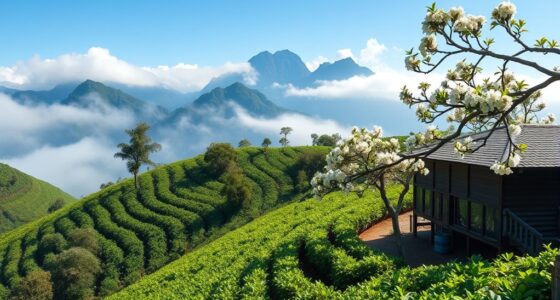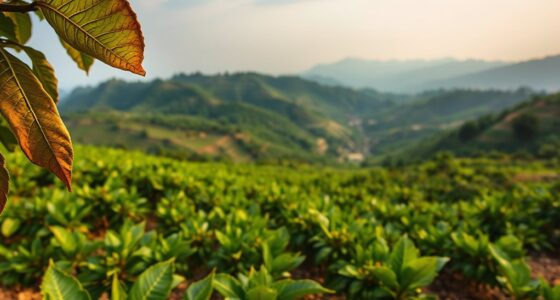Discover Ethiopia, the birthplace of coffee, where centuries-old traditions shape its unique flavors. You’ll find that the land’s high-altitude regions, fertile soil, and climate create perfect conditions for Arabica beans, cultivated by small farmers with deep cultural roots. Traditional processes like hand-picking and roasting preserve this heritage, making Ethiopian coffee rich in history and taste. If you keep exploring, you’ll uncover even more about how Ethiopia’s culture and land influence its exceptional coffee.
Key Takeaways
- Ethiopia is the birthplace of coffee, with a rich cultural heritage deeply connected to its cultivation and traditions.
- Ethiopian coffee is primarily Arabica, known for its complex and diverse flavor profiles influenced by land and climate.
- Smallholder farmers handpick ripe cherries, preserving centuries-old cultivation methods that reflect Ethiopia’s cultural identity.
- Coffee processing in Ethiopia maintains traditional techniques, ensuring high quality and authentic flavor expressions.
- The Ethiopian coffee ceremony symbolizes hospitality and community, highlighting the cultural significance and unique social role of coffee.

Have you ever wondered where coffee truly originates? The answer takes you to Ethiopia, the birthplace of this beloved beverage. In Ethiopia, coffee isn’t just a drink; it’s a vital part of life that reflects the country’s rich history and vibrant culture. The journey begins with coffee cultivation, which is deeply rooted in the land and climate of Ethiopia. The country’s high-altitude regions, fertile soil, and ideal weather create perfect conditions for growing Arabica beans, the variety renowned worldwide for its complex flavors. Smallholder farmers often cultivate coffee on family farms, tending to their plants with care handed down through generations. These beans are harvested by hand, with ripe cherries carefully picked to ensure quality. The process of coffee cultivation in Ethiopia isn’t just about production; it’s about preserving centuries-old traditions that connect farmers to their heritage. As the beans are processed, they carry the essence of the land and the stories of the people who nurture them, creating a foundation for Ethiopia’s unique coffee profiles.
Once harvested, the journey continues into the domain of cultural coffee ceremonies. In Ethiopia, these ceremonies are more than just brewing coffee—they’re a social ritual that unites communities and families. Picture yourself participating in a traditional coffee ceremony, where the aroma of freshly roasted beans fills the air. The process begins with roasting green coffee beans over an open flame, allowing their oils to release rich fragrances. Then, the beans are ground using a mortar and pestle, emphasizing the hands-on, communal aspect of the tradition. The ground coffee is brewed in a special pot called a jebena, often over a charcoal fire, which imparts a distinct smoky flavor. During the ceremony, the host serves the coffee in small cups, often accompanied by popcorn or other snacks, while engaging in lively conversation and storytelling. This ritual emphasizes hospitality, respect, and connection, making coffee a symbol of friendship and cultural identity. The significance of the Ethiopian coffee ceremony goes beyond taste; it’s a reflection of the country’s values and its deep-rooted appreciation for community.
Frequently Asked Questions
What Are the Traditional Ethiopian Coffee Brewing Methods?
You’ll typically experience traditional brewing during an Ethiopian coffee ceremony, where you prepare coffee using a jebena, a special clay pot. The process involves roasting green coffee beans, grinding them fresh, and boiling the grounds in the jebena. This coffee ceremony emphasizes hospitality and community, making the traditional brewing method a cherished ritual. It’s a slow, respectful process that highlights the cultural significance of Ethiopian coffee.
How Does Altitude Affect Ethiopian Coffee Flavor Profiles?
You’ll notice that altitude impact plays a big role in Ethiopian coffee flavor development. Higher elevations slow bean maturation, allowing complex sugars and acids to develop fully. This results in vibrant, nuanced flavors with bright acidity and floral notes. Lower altitudes produce beans with bolder, earthier tones. So, as altitude increases, expect a more refined, aromatic coffee experience that highlights the unique flavors characteristic of Ethiopian beans.
What Are the Key Regions Within Ethiopia Known for Coffee Cultivation?
Think of Ethiopia’s coffee regions as a vibrant tapestry, each thread representing a unique flavor. You’ll find the Sidamo zone, known for bright, fruity notes, and Yirgacheffe, famous for floral, aromatic profiles. Harrar offers bold, wine-like flavors, while Limu boasts a balanced, mellow taste. These coffee cultivation zones shape regional flavor profiles, giving you a rich sensory journey through Ethiopia’s diverse and storied coffee landscape.
How Is Ethiopian Coffee Typically Prepared in Local Ceremonies?
You participate in Ethiopian coffee ceremonies by first roasting fresh coffee beans over an open flame using traditional utensils like a jebena, a special clay pot. The beans are ground and brewed directly in the jebena, filling the air with rich aroma. During the ceremony, you pour the coffee into small cups, often accompanied by popcorn or snacks, creating a warm, communal experience that celebrates Ethiopian hospitality and tradition.
What Sustainable Practices Are Used in Ethiopian Coffee Farming?
Imagine a world where every cup you enjoy nurtures the earth. Ethiopian coffee farmers embrace sustainable practices like water conservation and organic certification, protecting their land for future generations. They avoid harmful chemicals and use efficient irrigation methods, ensuring the environment remains healthy. By supporting these practices, you help preserve Ethiopia’s rich coffee heritage, fostering eco-friendly growth that benefits both farmers and coffee lovers worldwide.
Conclusion
As you savor Ethiopian coffee, imagine a lush, vibrant landscape where each sip paints a masterpiece of flavors—fruity, floral, and earthy. This coffee isn’t just a drink; it’s a journey to the cradle of civilization, a living tapestry woven with history and tradition. Embrace its rich heritage, and let each cup awaken your senses like a sunrise breaking through misty hills, reminding you that you’re tasting the very soul of Ethiopia’s timeless gift to the world.









